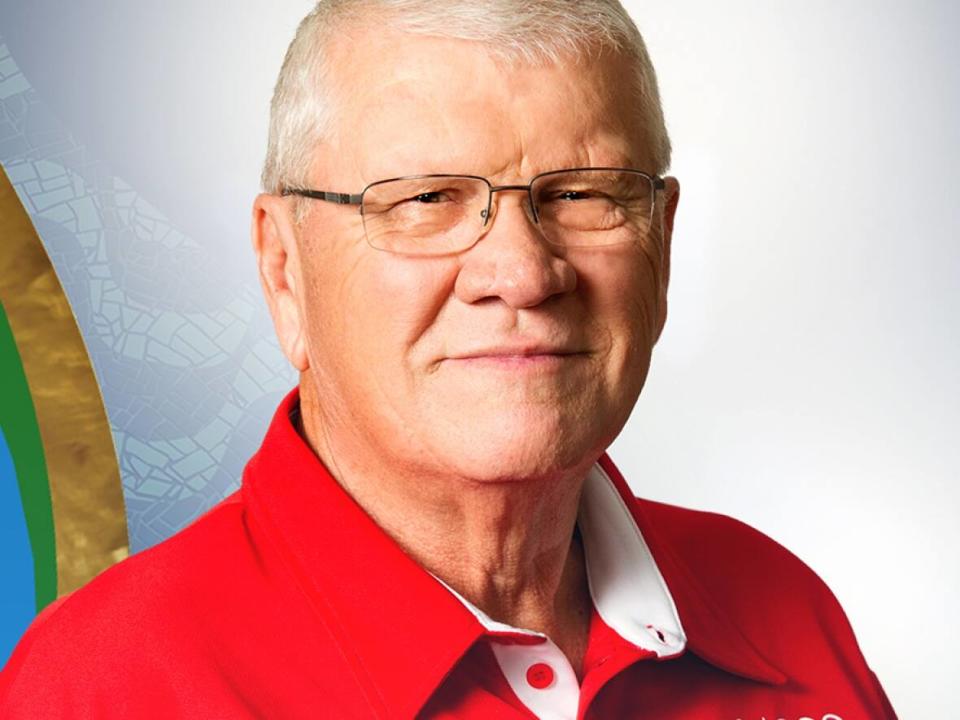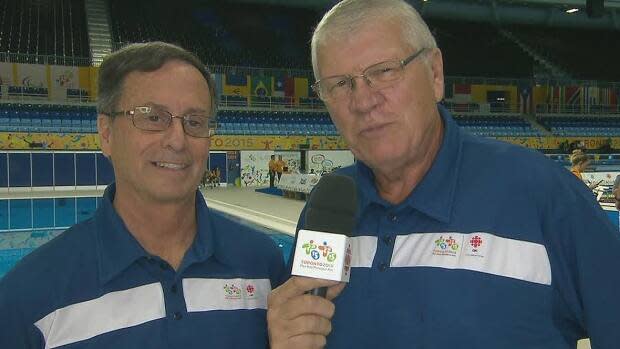After a career calling some of Canada's greatest moments, Steve Armitage gets his call to the Hall of Fame

With all the noise that's out there, I'm missing the sound of his voice and I'm willing to wager that I'm not alone.
For most of the past six decades, Steve Armitage has been a genius when it comes to delivering the spontaneous and immediate description of sport — any kind of sport.
He's the ultimate play caller who possesses that unique ability to capture the drama of a race.
Steve's retired now, living the good life and playing golf or going fishing whenever he can. When I contacted him not so long ago at his home in rural Nova Scotia to chat about his induction to the CBC Sports Hall of Fame, he feigned restlessness.
"Never, ever, retire," boomed the voice at the other end of the line. "You can only rake so many leaves. I knew once they closed the golf course I was doomed."
Armitage has been mastering the art of broadcast play-by-play dating back to the 1972 Olympics in Munich. He's called everything from archery to bowling to diving — dozens and dozens of athletic events over the course of a career which has spanned more than half a century.
But it's the racing sports where he soared above the rest. Truth be told, he's made it into an art form.
WATCH | Steve Armitage tribute:
Let me go back to my first network sports assignment at the 1987 Canada Games in Cape Breton. "Army", as we've always nicknamed him, was the host of the show. I was a rookie presenting long-form reports on alpine and cross-country skiing. That is until we had to edit a 16-minute piece on the fly and voice it live to air.
No time to pre-package. My television moment of truth had arrived.
They hustled me into the studio, and I threw on one of those bright, salmon-coloured, CBC Sports blazers that a senior colleague had loaned me. They sat me next to Steve Armitage, (a god of sports broadcasting in my estimation), and he looked me sternly in the eye while gently relieving me of my voluminous and insanely jumbled notes.
"Put these right here between us," he growled, not unkindly. "If you screw it up I'll take over. You'll be OK."
With that the red light went on and I sweated my way through my first live play-by-play, not perfectly by any means, but without "Army" feeling compelled to interject. He had effectively held my hand and gotten me through.
I'll always remember his immense generosity at my time of need.
Serious business
Signa Butler, his successor behind the speed skating microphone, and a graduate of St. Mary's University in Halifax where Armitage starred as a quarterback, remembers a winter snowstorm in Nova Scotia which prevented him from getting to Toronto for an assignment.
"I got tapped on the shoulder to call the World Cup with less than 24 hours notice and Steve immediately reached out and offered to go through what it's like to call races," she said. "We watched hours of racing virtually while chatting on the phone and he answered any questions I had.
"I was still nervous as heck to try and follow in his footsteps, but I wouldn't have gotten through it without his expertise."
Armitage does not take this sort of thing lightly. To him the race — every kind of race — is serious business.
WATCH | Steve Armitage makes final call of Olympic career:
And through the hundreds of thousands of races he's described over the course of his journey behind the microphone, he's developed a methodology. It's a uniquely fashioned formula for creating imagery and magic moments.
"Each race has its own cast of characters. You try to build the story of the race based on the characters," he said. "Don't be afraid to commit because there's nothing worse than holding back. Sport is not measured, it's off the rails. Let the energy and excitement come through and don't be too measured."
Kristina Groves won four medals in Olympic speed skating and reckons that alongside "Army" she called well over 500 races on both the short and long track at the Olympic Winter Games.
"Of course, his famous line at the end of a race, 'Driving to the line!' is a classic. Can't you just hear it?" she marveled. "His preparation is absolutely meticulous and incredibly thorough while his notes are legendary because of his immaculate calligraphy.
He is fantastically good at managing the timing and delivery of everything he says. - Kristina Groves
"But he is fantastically good at managing the timing and delivery of everything he says. Steve is a master at reflecting a race through the tone and volume of his voice."
Swimmer Byron Macdonald starred for Canada at the 1972 Olympics in Munich and competed against the legendary American Mark Spitz, who won seven gold medals at those Games. He worked as an analyst in tandem with Armitage beginning in 1990, a period encompassing four Olympics and seven Commonwealth Games. By his own estimation he witnessed several thousand races as Armitage's ally in the broadcast booth.
One thing stands out above everything else.
"His passion for the sport," Macdonald said without hesitation. "He truly appreciates the sport he is covering. And because of that he comes at it with knowledge. I think the viewer can pick that up. The races mean something to him."

'National treasure'
Rob Snoek, who has taken up the reins as the voice of swimming at CBC Sports, remains full of wonder whenever he thinks of whose path he's attempting to follow.
"Steve is an artist who used the easel of broadcasting to proudly paint athletes into the consciousness of Canadians," Snoek said. "He treated every one of his play-by-play calls with great respect. It will take many of us working very hard for many years to come to even attempt to fill his shoes, and I fear we will still fall short in our efforts."
Not only has his voice resonated with a sports loving audience, but the principal characters of his narrative have also been inspired by Armitage's ability to weave their story.
"It has been one of the highest honours to work alongside someone who birthed my Olympic dreams just as much as my hero Catriona Le May Doan did," said Anastasia Bucsis, a current CBC speed skating analyst and two-time Olympian. "I so viscerally remember her success and Army's voice cementing in my mind that I wanted to do 'that' one day. He is a national treasure and one of the greatest voices in sport, ever."
Over the course of our chat, Steve picked out Le May Doan's first of two career gold medals, which was won at the Nagano Games of 1998, as being the most precious race call in his recollection. It was the first time he had described the efforts of a Canadian Olympic champion.
Le May Doan's 1998 gold a highlight
"It seems like yesterday," he said a bit wistfully. "It was the end of a long drought. I thought I would never call one. I have called a few since then, but that one I will never forget."
For her part, Le May Doan beamed at what it meant not only to win Olympic gold for the first time, but also to have Armitage herald the victory across the country.
"I'm so honoured that Steve was able to call my first gold in 1998 and it was even more special as it was his first Olympic gold medal call," she said. "He is a perfectionist and one of the most respected broadcasters in the land.
"I learned from the best and was humbled to spend many years calling speed skating races beside him. Most of all, I always admired his passion for sport."
As I hung up the phone it occurred to me that I had spent the entire conversation being transfixed by hearing Steve Armitage's rollicking voice again. It's that low rumble that rises to a crescendo at just the right moment when a plot point arrives.
Many of us grew up listening to that voice. It had the ability to elevate sport in our mind's eye.
When it came to the story of a race and making it compelling, even riveting, "Army" never failed to answer the call.

 Yahoo Sports
Yahoo Sports 
